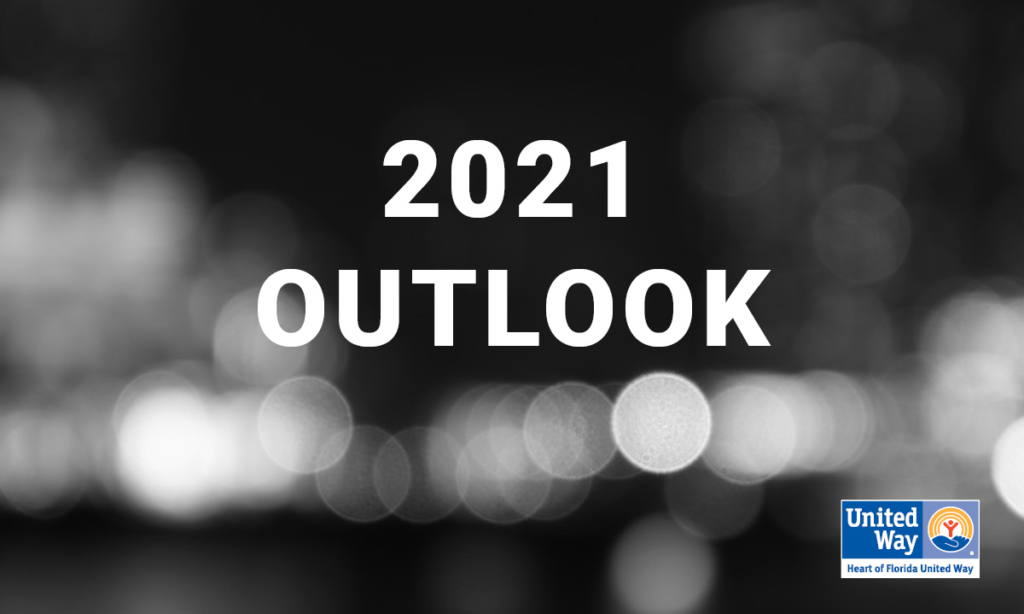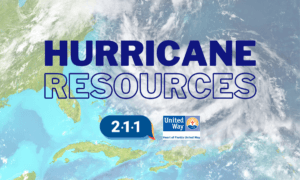The impact from the COVID-19 pandemic on Central Florida’s local economy and housing market is real… and it will have long-term implications for the prosperity of our community overall. These issues are interconnected, complex and have a direct impact on our neighbors’ well-being and our businesses.
Heart of Florida United Way recently hosted a conversation exploring trends and issues anticipated to impact the economy and community in 2021. Presenters included nationally acclaimed economist Dr. Sean Snaith, Director of the University of Central Florida’s Institute for Economic Forecasting, and Jeff Hayward, President & CEO of Heart of Florida United Way.

Here are the top 10 takeaways from the conversation:
- This recession is deeper than the Great Depression, which began in March and likely ended in May. Recovery will not mirror the recession as in a V shape. The plunge was not gradual like we saw in 2008-09, it only took place in a matter of weeks, not quarters. While still sharp, the recovery will not be quite as steep as the recession, but a more gradual build.
- Reimplementation of shut-downs would plunge the economy into an even more severe recession. Public health measures flipped the off switch for large swaths of the economy. If we were to repeat March and April, it would probably be even worse than it was then and may even lead to a depression as opposed to just a recession.
- The outlook for an economic bounce back is expected to be good. In any recession, you have pent-up demand from spending that didn’t happen during the recession out of concern for the financial future. When recessions end, that demand is released. This is pent up demand squared – financial and people literally being pent up and not going out to spend money.
- Housing market weighed very heavily on the Florida economy in the 2008 recession. We don’t have that problem now. However, we still have the same problem we did pre-pandemic. Sales are continuing to improve and prices continue to rise. Median prices are well above peak prices that we saw in 05-06.
- Are we seeing another bubble forming? Inventory levels are well below that of a balanced market, making it a seller’s market or what an economist calls a shortage. This drives prices higher. What we don’t have now as we did in 2005 is easy financing. Mortgage availability is nowhere near what fueled the housing bubble. In Orlando, median prices are up 12.7%. There is 1.9 months of inventory (very low). Affordability and lack of housing are the issues we face. We don’t have the burden of the housing market weighing on this recovery, so in that sense, we aren’t dealing with that long -lasting burden.
- Unemployment was very extreme during this recession. There was much higher unemployment in a much shorter amount of time. Pretty devastating to our labor market. The Leisure and Hospitality industry should see large annual growth due to a depleted base. Recovery is underway. This sector has to dig itself out of a bigger hole than other sectors.
- Population growth will continue to drive us. People being able to work remotely and the age of population contribute to this principle.
- Limited financial reserves caused gaps in our safety of services to emerge. Many nonprofits didn’t have reserves to dip into to remain operational when the economic impacts of COVID-19 hit. Non-profits, like businesses, have to pay rent, salaries to keep the lights on and remain operational. There is a cruel inverse relationship between a need in the community and financial support. When times are tough, the demand for services is great, but donations typically fall behind. Donor fatigue is a challenge from the nonprofit perspective. They are businesses too and we need to treat them as such.
- Evictions are a big concern. Although there has been an eviction moratorium in place, the rent meter has been running. It’s been hopeful to see local supports in place (Eviction Diversion program, Clerk of Courts, Legal Aid support, etc.), but we fully anticipate still seeing a large wave of displacement once the eviction moratorium is lifted.
- Minimum wage is a double-edged sword. Younger people getting into the market will likely have a hard time getting their foot on the first rung of the employment ladder, given a potential reduction in jobs. This might impact their livelihoods later down the line. Families should do some hard calculations to see they might be impacted. There is potential for some who might experience an increase in income due to the increase in minimum wage to now lose their qualification for access to benefits, pushing them over the “fiscal cliff”. For some, an increase in $2,000 a year in income, wouldn’t be worth losing $8,000 a year in childcare subsidies.









